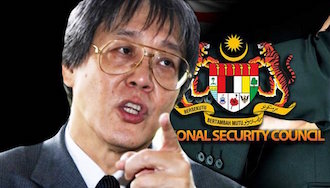Gov’t using NSC Bill as a coup d’etat, says Chang
(WikiSabah) – Senior lawyer Matthias Chang has alleged that the government is attempting a “reverse coup d’etat” through National Security Bill 2015 to stay in power and suppress dissidents.
“I can sum up the purpose of this legislation – (to attempt a) reverse coup d’etat. This is the only objective of the legislation,” he said.
“The law will be irrelevant. Why? You can shout, argue and say everything in our favour. But all these objections will mean nothing if there is a false flag operation, a huge explosion right in Kuala Lumpur centre, or a man-made assassination.
“A minister will then declare the area a (security area). The entire country will support this legislation,” he said.
Chang even foresees the next general election will not be called by the prime minister if the bill is enforced.
According to him, the government knows that 80 percent of the people in key institutions are against the government, and thus the bill will be used against them.
“They (the government) will not allow anyone to initiate any action that can be seen as a threat to the power structure,” he said at a NSC forum last night.
“Normally, a coup detat comes from the army and low-ranking officers. But in a reverse coup d’etat (by the government) everything will be demolished.
“Even the army has no role to play, it has to obey,” said Chang, the former political secretary to ex-prime minister Dr Mahathir Mohamad.
Both Chang and his client Khairuddin Abu Hassan were detained under the Security Offences (Special Measures) Act (Sosma) for about two months after they lodged reports in a few countries in connection with the 1MDB fiasco. They were later released on bail.
Chang was speaking at the NSC forum dubbed ‘National Security Council Bill – Chain of Command Compromised?’
He urged NGOs to review their methods of explanation against the bill in a simpler way to get the support of the public.
According to him, a reverse coup d’etat is a term that is even understood by hawkers and the man in the street.
National Human Rights Society president Ambiga Sreenevasan concurred with Chang, saying she would not be surprised if the 14th general election is postponed indefinitely.
“He (Prime Minister Najib Abdul Razak) can declare a state of emergency whenever he wants. He can use this power as an excuse to stop the next national polls from taking place. It’s his way of remaining in power,” she said.
Ambiga was one of the forum panellists. Other speakers were Research for Social Advancement senior fellow and Bar Council Human Rights Committee co-chairperson Andrew Khoo.
Khoo said Malaysia is moving towards a state where the government is manipulating the military for political gains, while countries like Myanmar are moving out of a military situation and heading towards democracy.
Lam (photo), who obtained his Master’s degree in Strategic and Defence Studies from Universiti Malaya, proposed that the government replace the NSC Bill with a bill concentrating on reforming the security regime.
“Right now, I foresee the NSC will be used to protect Najib’s regime, rather than dealing with international, national and comprehensive security issues,” he said.
“Developed countries have their own NSC, but they play only an advisory role,” he said.
He criticised the government for misplacing its priority on security issues, as it needs to formulate a national security policy instead of dwelling on the NSC Bill.
Lam, a former journalist, also expressed his concern that the NSC would become another Central Intelligence Agency (CIA) like in the United States.
Comparing the functions of CIA and NSC, he concluded that the government was in fact emulating CIA as both have 70 to 80 percent similarity.
“The NSC is in fact empowered to be a super intelligence agency. The bill demands that all government entities must transmit national security-related information or intelligence to the NSC,” he said.
“We need to transform our intelligence. We need to set up an accountable intelligence agency which is subject to parliamentary review,” he said.
Lam said the military had identified the Sulu Royal Army as one of Sabah’s external threats way back in 2008.
If initial steps had been taken to deal with the situation, the 2013 Sulu incursion might not have happened, he said.
He also urged the government to abolish the Special Branch, as the country does not need a policing and political intelligence agency that harassed politicians, NGOs and the people.


